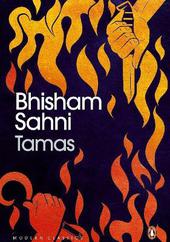
|
Tamas
Paperback / softback
Main Details
Description
'Tamas, in either Rockwell's translation or the original Hindi, remains an essential text for the times' Nilanjana Roy, Business Standard 'Tamas is a prophetic warning against the use of religion as a weapon to gain and perpetuate political power' GOVIND NIHALANI In a city in undivided Punjab, Nathu, a tanner, is bribed to kill a pig. When the animal's carcass is discovered on the steps of the local mosque the next morning, simmering tensions explode into an orgy of bloodlust. But in the midst of the ensuing carnage, despite the darkness of the times, rare moments of unexpected friendship and love also surface. Winner of the Sahitya Aakdemi Award, Sahni's iconic novel about the Partition of India tells the tale of an unfolding riot from different vantage points. In Daisy Rockwell's definitive translation, this magnificent work comes vividly to life. 'Tamas drove the point home that ordinary people want to live in peace' Guardian
Author Biography
BHISHAM SAHNI (1915-2003) was an iconic writer who transformed the landscape of Hindi literature. Sahni was fluent in several languages-Punjabi, Hindi, Sanskrit, Urdu and English-and his oeuvre encompassed a wide range of literary forms: novels, short stories, plays, essays. Tamas, his best known novel, won the Sahitya Akademi Award in 1975 and was subsequently adapted into a National Award-winning film by Govind Nihalani. His other well-known novels include Jharokhe (published in Penguin Classics as Boyhood), Basanti and Mayyadas Ki Marhi (published in Penguin Classics as Mansion). Sahni also wrote numerous short stories (a selection of which has been published in Penguin Classics as Middle India), six plays and a biography of his brother, the eminent film and stage actor Balraj Sahni. His autobiography, Aaj Ke Ateet, is published in Penguin Classics as Today's Pasts. Born in Rawalpindi, Sahni later went to college in Lahore. In his youth he became involved with the Indian People's Theatre Association as well as the Indian National Congress. After Partition, he settled down in Delhi and began to teach at Delhi University. From 1957-63, he moved to the USSR to work as a translator at the Foreign Languages Publishing House, before returning to Delhi. He edited the literary journal, Nayi Kahaniyan, from 1965-67, and was the general secretary of the All-India Progressive Writers' Association from 1975-85. Sahni was awarded the Padma Bhushan in 1998, and the Shalaka Award, the Delhi government's highest literary prize, in 1999. DAISY ROCKWELL is an artist and writer living in northern New England. She paints under the takhallus, or alias, Lapata (Urdu for 'missing'), and has shown her artwork widely. Rockwell holds a PhD in Hindi literature and has taught Hindi-Urdu and South Asian literature at a number of American universities. Apart from her essays on literature and art, she has written Upendranath Ashk: A Critical Biography, The Little Book of Terror-a book of paintings and essays on the global war on terror-and the novel Taste. She has translated a collection of Ashk's short stories, Hats and Doctors, and Falling Walls (both published in Penguin Classics), a widely acclaimed translation of Girti Divarein, the first volume of Ashk's epic novel cycle. Her translation of Bhisham Sahni's iconic Partition novel Tamas is regarded as the definitive English rendition of that work.
|